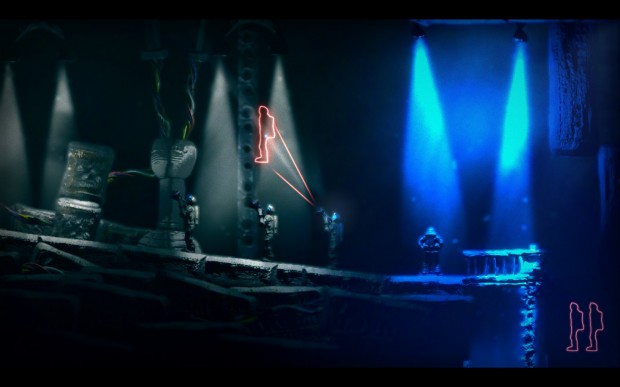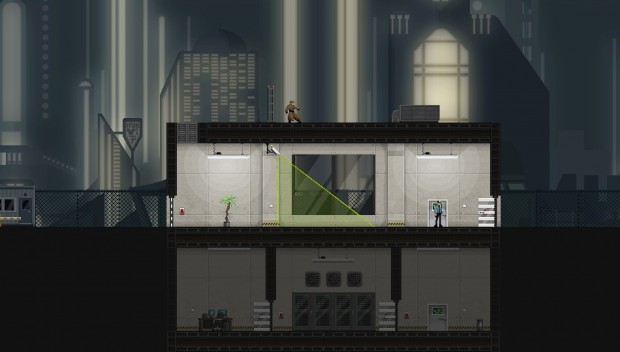Indie Rock: Gunpoint and The Swapper
- Updated: 6th Jun, 2013

A miracle happened. Someone hacked into my computer, accessed my list of things that a video game should achieve and then didn’t decide to use that knowledge for evil. They did, presumably, share it with the developers of this week’s best games. If this is the result of a total lack of privacy then I’m a newfound convert, finally recognising the necessity of Theresa May’s Snooper’s Charter. Bring on the war with Eastasia.
Gunpoint, the first release from love-swarmed hunk and better game writer than any of us, Tom Francis, is out as of this week. I’ve finished it. It’s lovely. It’s the best stealth game in years. What’s hyperbole? Never heard of it.
The Swapper, the first release from terribly-named FacePalm (signified by a tree with a smile, a joke that’s clever once and then makes you wonder how they finished an entire game without changing their mind about it) is also out as of this week. I haven’t finished it yet. It’s a great way to feel like you’re a Mensa candidate even if you’re the kind of person who gets out of bed late and writes a column on the internet before they’ve eaten anything.
Each contains disparate approaches in tone, one being a goofy noir story about a bloke with a pair of trousers that prevents him from dying from a fall, the other a sparse and dramatic tale centered around a piece of machinery that creates perfect clones of the user, then lets them inhabit their minds, leaving their own body behind. What’s excellent is the way in which the two games overlap. It’s an important explanation why they’re such successes. The games aren’t similar, but they have the same approach to providing a player-focused experience based on understanding systems and interacting with them in a way they personally devise.
I started thinking about this a lot after I read Tom Francis’ manifesto for the kind of games he’d make if Gunpoint was enough of a success to sustain him (in retrospect it’s hilarious he wasn’t able to seeing it coming, silly goose). In it he brings up suggestions of why this type of gaming is important, what the medium can achieve and why games that don’t put emphasis on player creativity (instead depending on spectacle for their point of interest) are doing a disservice to their audience.
The part specifically about “clear rules but surprising results” stood out most and I’ve been going back to it in my head while I’ve been playing the two games.
“If you fire your gun in Deus Ex, the locked door you’ve been trying to get through might suddenly swing open. That’s surprising, but it’s the result of rules you probably already knew: guards can hear gunshots, there’s a guard in that restricted area, and guards can open locked doors.
I want to make games where all the rules are clear enough that you can plan your approach, but intricate enough that you don’t always fully predict the result.”
It’s very clear how the worlds of each game work. In Gunpoint you mostly use something called the Crosslink to string together electrical circuits, tricking guards into performing predetermined actions like walking toward a light switch if it’s turned off, or turning to face loud sounds. In The Swapper you make clones and inhabit them, limited by different colours of light that either prevent creation or limit your movement. In each, there’s always one goal you’re aiming to achieve; Gunpoint doesn’t offer a clear solution and lets you make your own way, The Swapper has only one answer, but you’ll try a variety of options to get you there. Each are reached by experimenting with what’s possible rather than acting out the obvious.
 Something great about both games is the way in which they apply new systems. You never get a new ability in Swapper, but the rooms contain a few curveballs that’ll ask you adjust your playstyle. For the most part the only obstacle isn’t that you’re unable to perform a task because you don’t have the ability, it’s because you haven’t been asked to think the right way yet. Gunpoint’s different about this; there’s additions to your repertoire, but mostly they augment existing abilities. The final mechanic that it introduces, though, subverts so much of the game it’s shocking. It achieves an incredible reaction from waving away a previous systemic concern.
Something great about both games is the way in which they apply new systems. You never get a new ability in Swapper, but the rooms contain a few curveballs that’ll ask you adjust your playstyle. For the most part the only obstacle isn’t that you’re unable to perform a task because you don’t have the ability, it’s because you haven’t been asked to think the right way yet. Gunpoint’s different about this; there’s additions to your repertoire, but mostly they augment existing abilities. The final mechanic that it introduces, though, subverts so much of the game it’s shocking. It achieves an incredible reaction from waving away a previous systemic concern.
You honestly need to buy both of these important pieces of work without hesitation. It’s a great week for video games. Goddamn.
Oh, Also
It feels a little awful bringing publicity to an event now that there’s seemingly no way to get in, but just in case something’s figured out and it’s actually possible, maybe check out EToo next week at Soho’s Loading Bar for a glimpse at a few upcoming indie games and chats with game-related people that aren’t going to E3. Specifically look out for Redshirt and Sir, You Are Being Hunted because hey, you know what? Those Are Worth Seeing.
I also recommend the drinks. Ask for the one with gin in it. It’s pretty great.

Pingback: What I read: interpreting media and presenting criticism « Normally Rascal
Pingback: Week in Review: interpreting media and presenting criticism « Normally Rascal
Pingback: This Week I Read: interpreting media and presenting criticism « Normally Rascal